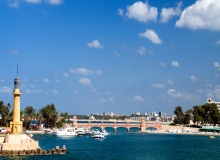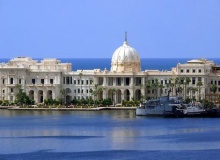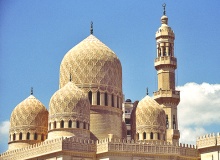Egypt
Cairo | Luxor | Alexandria
A travel destination home to one of the greatest ancient civilisations
It is no secret that Egypt has one of the greatest ancient civilizations to have ever existed. The Nile River, the lifeblood of the country, has shaped Egypt's character and development since prehistoric times. The Great Pyramids stand as testament to the earliest days of Egypt's grandeur. Beyond the arches, temples and statues of the ancient world lie the country's glorious Pharaonic, Christian and Islamic legacies. Today Egypt is a medley of these great and diverse eras, living in an unusual synchronization. The modern reality of the country encompasses the awe-inspiring legacies of its eons of history but it also includes the complexities and contradictions of a major player in 21st-century Middle East politics.
The country's allure extends far beyond its famous capital. The desert offers encounters with sites of biblical renown (like Mount Sinai, where Moses is said to have received the Ten Commandments) and modern Bedouins (many trekking adventures include visits with the desert tribes). Alexandria, on the Mediterranean coast, holds more former glory than any contemporary cachet, but its cultural landmarks are irresistible. Luxor, in the south, is home to a rich array of ancient temples, tombs and ruins, as well as exotic local cuisine.
Egypt is also a popular destination for sun-worshippers, diving and water sports enthusiasts as the Red Sea in the east boasts some of the world’s best snorkelling opportunities, scuba diving sites, night spots, luxury hotels and great restaurants. The resort town of Hurghada is the launching point for both sea and Sahara desert excursions.
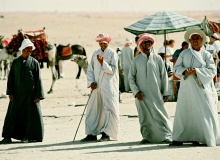

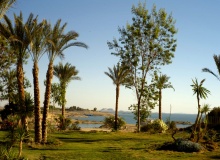
Cairo
Cairo, Egypt’s capital city, is often called the “gateway to Africa”. It is the focus of all major routes leading to and from three continents – Asia, Europe and Africa. This city is an intense, dizzying metropolis. Like many Middle Eastern cities, it consists of an historic core replete with markets, mosques and medieval architecture. From this gravitational centre swirls a mishmash of affluent suburbs, skyscrapers and urban squalor.
The centre of one of the world's great ancient civilizations and home to the last surviving wonder of the world, the Pyramid of Giza, 21st-century Cairo is all hectic urban sprawl, a metropolitan area crammed with over 18 million people. One quarter of all Egyptians live in Cairo, and it is the most populous city in Africa. Cairo's location along the Nile River has made it the heart of the region from ancient times through to today.
Particularly popular amongst the astonishing array of ancient relics are the pyramids, just south of the city, including the iconic Sphinx, a half-human half-lion limestone figure built on desert sand. The Egyptian Museum is another gem; it holds treasures from the tomb of King Tutankhamen (including his solid-gold death mask) and a number of royal mummies.
Visitors should note that during the various Muslim holy days and festivals (the city is 94% Muslim), tourist attractions and businesses may have short opening hours or close early. During the month-long Ramadan, alcohol is rarely served outside of hotel bars and restaurants.
WHEN TO TRAVEL to Cairo
Cairo can be unbearably hot in the summer months between June and August. Best time to visit would be at any other time of the year. Winter evenings can be chilly, but if you are travelling south, is the best time to visit Egypt.
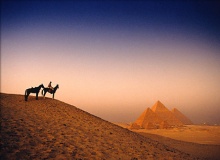
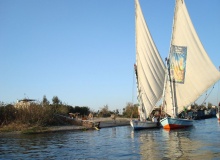
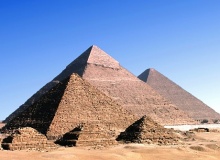
Luxor
Luxor is a city in Upper (southern) Egypt and the capital of Luxor Governorate. As the site of the ancient Egyptian city of Thebes, Luxor has frequently been characterised as the "world's greatest open air museum", the ruins of the temple complexes at Karnak and Luxor standing within the modern city. Immediately opposite, across the Nile River, lie the monuments, temples and tombs on the West Bank Necropolis, which include the Valley of the Kings and Valley of the Queens. Thousands of tourists arrive each year to visit these monuments, and their presence represents a large part of the economic basis for the modern city. As a result, Luxor represents an excellent base for touring Upper Egypt, and is a popular holiday destination, both in its own right and as a starting or finishing point for Nile cruises.
Built on the site of the ancient city of Thebes, Luxor is one of Egypt's premier travel destinations. The dynastic and religious capital of Middle Kingdom and New Kingdom Egypt, Luxor has much to offer the traveller, from vast temples, to ancient royal tombs, spectacular desert and river scenery and a bustling modern life. People have been visiting the magnificent monuments of Luxor, Karnak, Hatshepsut and Ramses III for thousands of years. Feluccas, old barges and luxury hotel ships cruise to and from Cairo and Aswan.
One time-honoured delightful way to visit the east bank of Luxor, especially at night-time, is by calèche, or horse-drawn carriage.
WHEN TO TRAVEL to Luxor
Winter is the best time to travel to Luxor between the months of November and March, this is also the high season and prices would reflect this. Summer is unbearably hot and dusty and temperatures can reach up to 50 degrees.
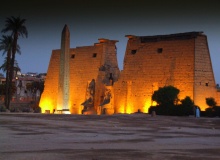
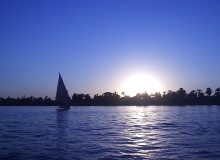
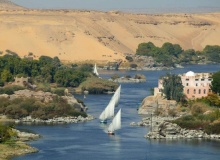
Alexandria
Alexandria is fascinating. Tourism has evolved to cater to legions of travellers every year. The prime attractions have been suitably well-developped for sightseeing and for cruises. Alexandria is one of the most sought-after and tourist-friendly places in all of Egypt.
Alexandria is the second largest city in Egypt and is known as “The Pearl of the Mediterranean”. The city exudes an atmosphere that is more Mediterranean than Middle Eastern. The ambience and cultural heritage, along with an exotic Oriental element, are truly captivating.
Founded by Alexander the Great in 331 BC, Alexandria became the capital of the Graeco-Roman Egypt. This was also the centre of learning in the ancient world. From the 19th C, Alexandria became the focus for Egypt's commercial and maritime expansion.
Today, tourism in Alexandria means exploring ancient archaeological sites or sunbathing on the tranquil beaches. Discover the fascinating world preserved in the libraries and museums of the city and by night you can dance in entertaining nightclubs and discos.
Essential sightseeing means a visit to the Graeco-Roman Museum, Pompey's Pillar, the Roman Amphitheatre, Catacombs of Kom al-Shoqafa. Al-Shatby Necropolis, the tombs of Al-Anfushi and Mustafa Kamel graveyard. The Fort of Qaitbay, the mosque of Mursi Abul Abbas and Al-Montazah Palace stand as great examples of architectural splendour.
There are lovely beaches stretching from east to west where you can spend a perfectly laid-back afternoon. The beaches of Maamura, Montaza Assafra, Miamy, Sidi Bishr, San Stefano, Ibrahimia and Shatby lie along the seafront boulevard.
WHEN TO TRAVEL to Alexandria
Being on the Mediterranean coast summers are hot but pleasant. Alexandria receives the most rainfall in Egypt during the winter months and it can get cold and windy during this time.
